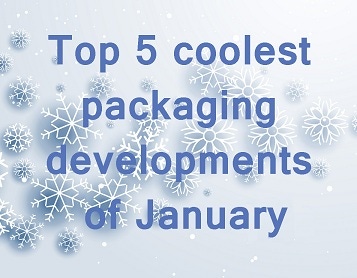Top 5 coolest plastics packaging developments of January
A cool month for many readers brought plenty of hot news in plastics packaging, most which center on developments related to recycling.

January has been an especially busy time on the Plastics Today packaging channel with a large number of featur es drawing solid interest. We present the best of the best based on web analytics as to what articles had the highest readership (Background vector created by Starline - Freepik.com with added text by PlasticsToday).
es drawing solid interest. We present the best of the best based on web analytics as to what articles had the highest readership (Background vector created by Starline - Freepik.com with added text by PlasticsToday).
Rather than our usual reverse order listing, we’re going to provide our own spoiler right from the top by revealing the #1 most-read article of the month, which centers on one of the more challenging undertakings of plastics recycling, that for plastic film. It’s a good news story not just because notable advancements are happening, they are relayed by the insightful, insider expertise of the American Chemistry Council’s Steve Russell, vice president of plastics.
Russell discusses the ACC’s WRAP program that aims to increase PE film recycling by raising consumer awareness that everyday used items can be recycled at more than 18,000 grocery and retail stores across the U.S. These include bags from produce, bread, and dry cleaning along with packaging from household paper products and beverage multipacks. Shipping pillows and bubble-style wraps, which we see a lot of this time of year, can also be recycled with film.
Russell also talks consumer education, challenges and dispenses advice for converters and more in Plastic film recycling making significant progress.
#2 Clare Goldsberry, PlasticsToday’s Contributing Editor/U.S, addressed activist consumer group As You Sow’s re-engaged war on polystyrene packaging at McDonald’s. In her fact-checking rebuttal to the group's claims, Goldsberry notes that its release states that expanded polystyrene (EPS) is “rarely recycled” and, thus, leads to it being discarded in marine environments.
“The group needs to bone up on the recycling information for this material,” she retorts, pointing out that, according to the 2016 EPS Recycling Rate Report produced by the EPS Industry Alliance, 63 million pounds of EPS postconsumer materials and 55.7 million pounds of post-industrial materials were recycled in 2016. That’s a total of 118.7 million pounds. EPS can be effectively recycled and reused, and the rate is increasing every year, according to the EPS Industry Alliance, which lists 87 member companies that recycle EPS foam packaging. Read more in As You Sow calls out McDonald’s on continued use of polystyrene
#3 Being a plastics engineer means you’re in select company among a larger group of plastics professionals that have their own vocabulary may have distinct character traits and certainly to a man or woman possess a keen interest in all things plastic. This was a prelude to our promoting an online, one-question poll that asks the burning question “You know you’re a plastics engineer if…”
PlasticsToday staff offered up suggestions to get things started, such as “You conduct liquid silicone rubber experiments in your kitchen oven” and “You consider MI5 is a low melt index for polypropylene and not the acronym for the British spy agency.”
Dozens of plastics professionals have already taken the poll, providing insightful if also wry definitions, for example:
Orientation best describes the machine and transverse direction of a process and not the very first class in high school.
You are touching, scratching and tapping plastic things whenever you see something new.
Your spouse (who is not an engineer and has not worked in the plastic industry) can evaluate plastics parts in the store and identify and name all the molding defects.
We invite you to read the article How can you tell if someone is a plastics engineer? and/or go directly to the poll at https://www.surveymonkey.com/r/PTengineers
#4 California is known as a trend-setting state, credited (or blamed) as a place where cultural movements become phenomenon, so it's often true that what starts in CA doesn't stay in CA.
As with many, California has requirements for recycling plastics. One distinction, however, is the state’s requirements for new plastic packaging that fall under the state’s Rigid Plastic Packaging Container (RPPC) program, the regulations of which also impose substantial penalties for noncompliance.
Natalie Rainer, associate, Keller and Heckman LLP (Washington, D.C.), provides an overview of the regulations and the containers that are exempt and those that would be under compliance. You can read her insights in Understanding California's rigid plastic container law.
#5 The next article provides an appropriate “bookend” to the top quintet of the month published in early January 4 that helped get the new year off to a rousing, if somewhat controversial start for an issue that has considerable history behind it: EPS food containers at McDonald’s.
Turns out the controversy dates back some 25 years.
Goldsberry again tells it best: “Every time I see another press release from the advocacy group As You Sow, I’m reminded how long this debate over McDonald’s use of expanded polystyrene foam food containers has been going on. While cleaning out some files, I found Wall Street Journal clippings on this topic dating back to the early 1990s."
She tells the rest of this old, but timely tale in EPS food container controversy—a tale (almost) as old as time.
If you’re hungry for more articles that resonated with your industry peers these past weeks, you'll find below hyperlinked headlines to the next 5 most-read stories for the month to round things up to a nice even Top 10:
6. Scientific tests prove HDPE can be recycled at least 10 times
7. UK government declares war on plastics
8. PET bottle with integrated handle approved for HPP
9. All of Amcor’s packaging to be recyclable or reusable by 2025
10. Will plastics cede to paper in the sustainable packaging market?
About the Author(s)
You May Also Like




